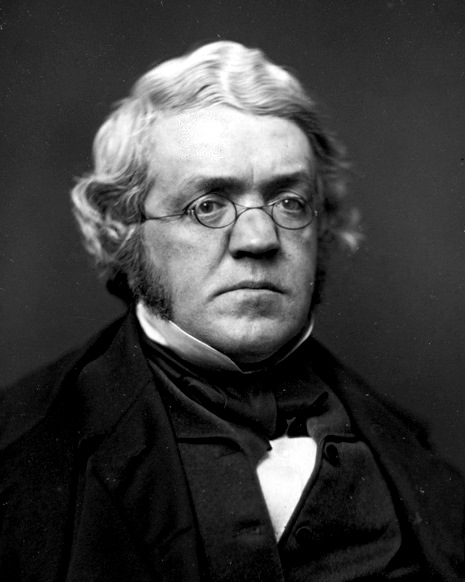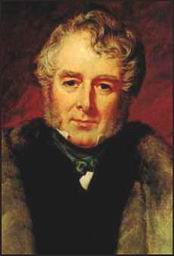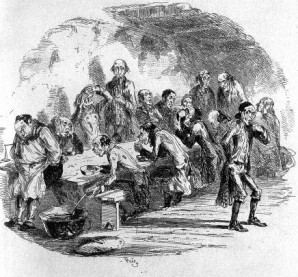
When Bob's holidays are over, and the printer has sent me back this manuscript, I know Christmas will be an old story. All the fruit will be off the Christmas tree then; the crackers will have cracked off; the almonds will have been crunched; and the sweet-bitter riddles will have been read; the lights will have perished off the dark green boughs; the toys growing on them will have been distributed, fought for, cherished, neglected, broken. Ferdinand and Fidelia will each keep out of it (be still, my gushing heart!) the remembrance of a riddle read together, of a double-almond munched together, and the moiety of an exploded cracker. . . . The maids, I say, will have taken down all that holly stuff and nonsense about the clocks, lamps, and looking-glasses, the dear boys will be back at school, fondly thinking of the pantomime-fairies whom they have seen; whose gaudy gossamer wings are battered by this time; and whose pink cotton (or silk is it?) lower extremities are all dingy and dusty. Yet but a few days, Bob, and flakes of paint will have cracked off the fairy flower-bowers, and the revolving temples of adamantine lustre will be as shabby as the city of Pekin. When you read this, will Clown still be going on lolling his tongue out of his month, and saying, "How are you to-morrow?" Tomorrow, indeed! He must be almost ashamed of himself (if that cheek is still capable of the blush of shame) for asking the absurd question. To-morrow, indeed! To-morrow the diffugient snows will give place to Spring; the snowdrops will lift their heads; Ladyday may be expected, and the pecuniary duties peculiar to that feast; in place of bonbons, trees will have an eruption of light green knobs; the whitebait season will bloom . . . as if one need go on describing these vernal phenomena, when Christmas is still here, though ending, and the subject of my discourse!
We have all admired the illustrated papers, and noted how boisterously jolly they become at Christmas time. What wassail-bowls, robin-redbreasts, waits, snow landscapes, bursts of Christmas song! And then to think that these festivities are prepared months before--that these Christmas pieces are prophetic! How kind of artists and poets to devise the festivities beforehand, and serve them pat at the proper time! We ought to be grateful to them, as to the cook who gets up at midnight and sets the pudding a-boiling, which is to feast us at six o'clock. I often think with gratitude of the famous Mr. Nelson Lee--the author of I don't know how many hundred glorious pantomimes--walking by the summer wave at Margate, or Brighton perhaps, revolving in his mind the idea of some new gorgeous spectacle of faery, which the winter shall see complete. He is like cook at midnight (si parva licet). He watches and thinks. He pounds the sparkling sugar of benevolence, the plums of fancy, the sweetmeats of fun, the figs of--well, the figs of fairy fiction, let us say, and pops the whole in the seething caldron of imagination, and at due season serves up THE PANTOMIME.
Very few men in the course of nature can expect to see ALL the pantomimes in one season, but I hope to the end of my life I shall never forego reading about them in that delicious sheet of The Times which appears on the morning after Boxing-day. Perhaps reading is even better than seeing. The best way, I think, is to say you are ill, lie in bed, and have the paper for two hours, reading all the way down from Drury Lane to the Britannia at Hoxton. Bob and I went to two pantomimes. One was at the Theatre of Fancy, and the other at the Fairy Opera, and I don't know which we liked the best.
At the Fancy, we saw "Harlequin Hamlet, or Daddy's Ghost and Nunky's Pison," which is all very well--but, gentlemen, if you don't respect Shakspeare, to whom will you be civil? The palace and ramparts of Elsinore by moon and snowlight is one of Loutherbourg's finest efforts. The banqueting hall of the palace is illuminated: the peaks and gables glitter with the snow: the sentinels march blowing their fingers with the cold--the freezing of the nose of one of them is very neatly and dexterously arranged: the snow-storm rises: the winds howl awfully along the battlements: the waves come curling, leaping, foaming to shore. Hamlet's umbrella is whirled away in the storm. He and his two friends stamp on each other's toes to keep them warm. The storm-spirits rise in the air, and are whirled howling round the palace and the rocks. My eyes! what tiles and chimney-pots fly hurtling through the air! As the storm reaches its height (here the wind instruments come in with prodigious effect, and I compliment Mr. Brumby and the violoncellos)--as the snow-storm rises, (queek, queek, queek, go the fiddles, and then thrumpty thrump comes a pizzicato movement in Bob Major, which sends a shiver into your very boot-soles,) the thunder-clouds deepen (bong, bong, bong, from the violoncellos). The forked lightning quivers through the clouds in a zig-zag scream of violins--and look, look, look! as the frothing, roaring waves come rushing up the battlements, and over the reeling parapet, each hissing wave becomes a ghost, sends the gun-carriages rolling over the platform, and plunges howling into the water again.
Hamlet's mother comes on to the battlements to look for her son. The storm whips her umbrella out of her hands, and she retires screaming in pattens.
The cabs on the stand in the great market-place at Elsinore are seen to drive off, and several people are drowned. The gas-lamps along the street are wrenched from their foundations, and shoot through the troubled air. Whist, rush, hish! how the rain roars and pours! The darkness becomes awful, always deepened by the power of the music--and see--in the midst of a rush, and whirl, and scream of spirits of air and wave--what is that ghastly figure moving hither? It becomes bigger, bigger, as it advances down the platform--more ghastly, more horrible, enormous! It is as tall as the whole stage. It seems to be advancing on the stalls and pit, and the whole house screams with terror, as the GHOST OF THE LATE HAMLET comes in, and begins to speak. Several people faint, and the light-fingered gentry pick pockets furiously in the darkness.
In the pitchy darkness, this awful figure throwing his eyes about, the gas in the boxes shuddering out of sight, and the wind-instruments bugling the most horrible wails, the boldest spectator must have felt frightened. But hark! what is that silver shimmer of the fiddles! Is it--can it be--the gray dawn peeping in the stormy east? The ghost's eyes look blankly towards it, and roll a ghastly agony. Quicker, quicker ply the violins of Phoebus Apollo. Redder, redder grow the orient clouds. Cockadoodledoo! crows that great cock which has just come out on the roof of the palace. And now the round sun himself pops up from behind the waves of night. Where is the ghost? He is gone! Purple shadows of morn "slant o'er the snowy sward," the city wakes up in life and sunshine, and we confess we are very much relieved at the disappearance of the ghost. We don't like those dark scenes in pantomimes.
After the usual business, that Ophelia should be turned into Columbine was to be expected; but I confess I was a little shocked when Hamlet's mother became Pantaloon, and was instantly knocked down by Clown Claudius. Grimaldi is getting a little old now, but for real humor there are few clowns like him. Mr. Shuter, as the grave-digger, was chaste and comic, as he always is, and the scene-painters surpassed themselves.
"Harlequin Conqueror and the Field of Hastings," at the other house, is very pleasant too. The irascible William is acted with great vigor by Snoxall, and the battle of Hastings is a good piece of burlesque. Some trifling liberties are taken with history, but what liberties will not the merry genius of pantomime permit himself? At the battle of Hastings, William is on the point of being defeated by the Sussex volunteers, very elegantly led by the always pretty Miss Waddy (as Haco Sharpshooter), when a shot from the Normans kills Harold. The fairy Edith hereupon comes forward, and finds his body, which straightway leaps up a live harlequin, whilst the Conqueror makes an excellent clown, and the Archbishop of Bayeux a diverting pantaloon, &c. &c. &c.
Perhaps these are not the pantomimes we really saw; but one description will do as well as another. The plots, you see, are a little intricate and difficult to understand in pantomimes; and I may have mixed up one with another. That I was at the theatre on Boxing-night is certain--but the pit was so full that I could only see fairy legs glittering in the distance, as I stood at the door. And if I was badly off, I think there was a young gentleman behind me worse off still. I own that he has good reason (though others have not) to speak ill of me behind my back, and hereby beg his pardon.




Rate and Review
Rate this article
Review this article
Log into OpenLearn to leave reviews and join in the conversation.
Article reviews